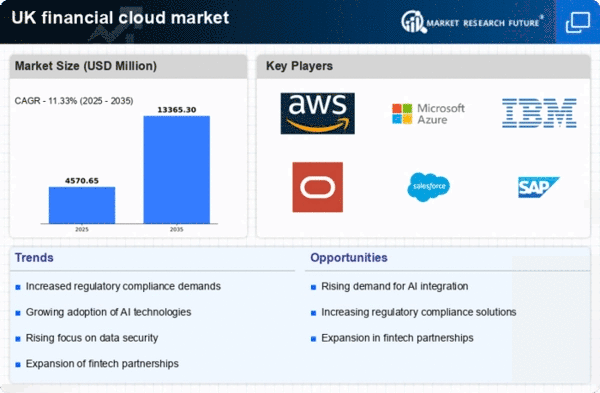Regulatory Compliance Pressure
The financial cloud market in the UK is experiencing heightened pressure from regulatory bodies to ensure compliance with stringent financial regulations. Institutions are increasingly required to adopt cloud solutions that not only enhance operational efficiency but also adhere to regulations such as the Financial Services and Markets Act. This compliance necessity drives the demand for cloud services that can provide robust security and data management capabilities. As of 2025, it is estimated that compliance-related expenditures in the financial sector could reach £5 billion, indicating a significant investment in cloud technologies that facilitate adherence to these regulations. The financial cloud market is thus positioned to benefit from this trend, as firms seek solutions that mitigate compliance risks while optimizing their operations.
Increased Focus on Data Analytics
The financial cloud market in the UK is witnessing a surge in demand for data analytics capabilities. Financial institutions are increasingly recognizing the value of data-driven decision-making and are turning to cloud solutions to harness large volumes of data effectively. By leveraging advanced analytics tools available in the cloud, firms can gain actionable insights that drive strategic initiatives. This trend is expected to contribute to a market growth of approximately 20% over the next few years, as institutions seek to enhance their analytical capabilities. The financial cloud market is thus positioned to thrive as firms invest in cloud technologies that facilitate sophisticated data analysis and reporting.
Shift Towards Digital Transformation
The ongoing shift towards digital transformation is a key driver of the financial cloud market in the UK. Financial institutions are increasingly recognizing the importance of adopting digital technologies to remain competitive. Cloud solutions play a pivotal role in this transformation, providing the necessary infrastructure for innovation and agility. As of 2025, it is projected that over 70% of financial firms will have migrated to cloud-based systems, reflecting a substantial commitment to digitalization. This trend not only enhances operational efficiency but also positions the financial cloud market as a vital component in the broader digital landscape, enabling firms to adapt to evolving consumer expectations.
Cost Efficiency and Operational Agility
In the UK, the financial cloud market is increasingly driven by the need for cost efficiency and operational agility. Financial institutions are under constant pressure to reduce operational costs while maintaining high service levels. Cloud solutions offer scalable resources that allow firms to pay only for what they use, potentially reducing IT expenditures by up to 30%. This financial flexibility enables institutions to allocate resources more effectively, fostering innovation and responsiveness to market changes. As the financial cloud market evolves, the emphasis on cost-effective solutions is likely to attract more players, enhancing competition and driving further advancements in cloud technology.
Demand for Enhanced Customer Experience
The financial cloud market is significantly influenced by the growing demand for enhanced customer experience in the UK. Financial institutions are increasingly leveraging cloud technologies to deliver personalized services and improve customer engagement. By utilizing data analytics and machine learning capabilities available in cloud platforms, firms can gain insights into customer preferences and behaviors. This trend is expected to drive a market growth rate of approximately 15% annually as institutions invest in cloud solutions that facilitate real-time interactions and tailored offerings. The financial cloud market is thus becoming a critical enabler of customer-centric strategies, allowing firms to differentiate themselves in a competitive landscape.
















